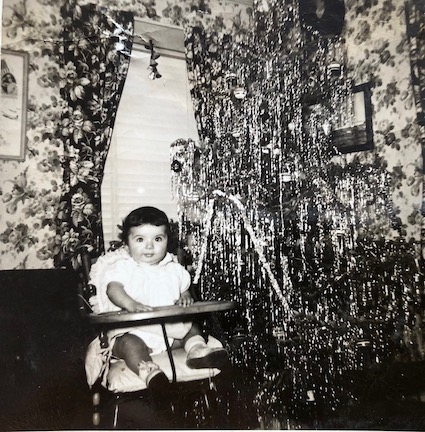The first Christmas I actually remember happened when I was a kid too young to go to Midnight Mass. My grandfather, Manny stayed home to babysit my cousins and me while our extended family walked to the church down the street.
Vovô, as I called him, was my father’s father and not one of those playful grandfathers. I just remember him opening a bottle of red wine and consuming it while we waited for the family’s return. He had the radio on, probably the Portuguese station that he loved. Having immigrated from the Azores, he thought the Portuguese singers were the best and he would try to demonstrate that by serenading me. Anyway, we kids were safe with Vovô until Mass was over and the gift exchange began.
Most of my Christmases as a child involved visiting. My parents, especially my father, were very sociable people although they never held parties at our home. The one exception was Christmas Eve when people would make the rounds. Most my father knew through the local athletic club. It was the only time alcohol was served in our home. I remember as a kid waiting to see if anyone would show up. That tradition faded out.
Another was going to people’s homes late at night and singing outside their doors until we were let inside. They were expected to feed the group of singers and I presume offer drink. We sleepy little kids went along. But that ended after a few years.
Yes, we received gifts from Santa until we realized he didn’t exist. I learned that when I happened to be in the attic and found unwrapped gifts intended for my younger sister.
We became full-time visitors on Christmas. For years, we had an early dinner with our grandmother Angela, who came to this country from the Portuguese island of Madeira when she was just a teenager. Her food had a rather foreign flavor. My sister and I said she must use a secret spice. Then we visited our aunt and uncle next door — their sons were childhood friends we saw every weekend. They were on my mother’s side. Then we were onto my father’s side, visiting the homes of his sisters. I can’t remember why, but one home we called Devil’s Island.
As for presents, we didn’t get a lot, understandably for the time. I recall when I was 12 being asked by my mother what I wanted. I honestly didn’t know but I pointed at a large doll dressed in a taffeta gown. I was well past the stage of playing with dolls but it seems I wasn’t ready to let my childhood go.
Over the many years, I have had a variety of Christmases, including a few awkward ones. Of course, that can happen because the holiday involves real life.
There were many times when we lived in Taos, New Mexico that it was just Hank and I, which was fine. We gave up having a tree and pared down our gift-giving. But we got to enjoy what that area has to offer for the holidays, including spending Christmas Eve watching the bonfires at Taos Pueblo and then having a drink at the Taos Inn. Sometimes family came to experience it.
Now that we have returned to New England, we spend the holiday with our children, granddaughters, and the extended family. Fun times for sure. I wish the same for you.
ABOUT THE PHOTO ABOVE: That’s a chubby me only eight months old at my grandparents’ home where I lived with my parents for the first few years of my life.




